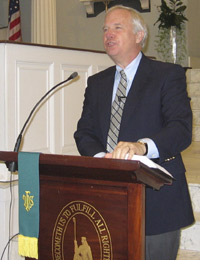“Salvation is the name for what it’s like to be caught up in the life of God,” a widely known preacher, teacher and author told participants in the 11th annual John A. Hamrick Lectureship hosted by First Baptist Church in Charleston Jan. 15-16.
 Hamrick lecture – William Willimon speaks at First Baptist Church, Charleston.
Hamrick lecture – William Willimon speaks at First Baptist Church, Charleston.William Willimon, a native of Greenville who graduated from Wofford College before earning graduate degrees from Yale Divinity School and Emory University, delivered two lectures on the theme of salvation, comparing that experience to being “awakened to a whole new world, knowing who’s in charge and where you’re headed. It’s a moment when you wake up and say, ‘I’m not in the same world.'”
Willimon is former dean of the chapel and professor of Christian ministry at Duke University and is now bishop of the North Alabama Conference of the United Methodist Church,
Formerly a pastor in Greenville, Willimon described God as “a father who waits, who seeks,” and who is both “relentless” and “infinitely resourceful” in his pursuit of people with whom he desires reconciliation through Jesus Christ. He said there is “no reconciliation” apart from Christ, that Jesus cannot be “merged” with other means of salvation.
“Whatever your lostness,” said Willimon, “Jesus is able to get to you, to get what he wants.”
He urged believers to “pray for the salvation of all” because “we should want what God wants – that none should perish. Salvation reminds us that the only difference between the church and the world is the recognition that Jesus died for sinners – and that’s you, and you want all to be saved.”
Willimon noted that salvation is connected to vocation. “To be saved by Jesus,” he said, “is to be called by Jesus.”
Jeff Rogers, pastor of First Baptist Church in Greenville, who was first introduced to the study of the Dead Sea Scrolls while earning his doctorate at Princeton Theological Seminary, said the scrolls, which became public in the late 1940s to the mid-1950s, reflect what he called “the dynamic process of scripture” as copyists attempted to “get the text right” while also “making sense of the text.”
Rogers said the sectarian documents contained in the Dead Sea Scrolls are of “extraordinary value” because of the insight they give into the Jewish community of that day. “They opened to us the words, ideas and perspectives of Jews which were the seedbed of Judaism and Christianity. They show the personality of the faith in which Jesus and his disciples were nurtured.”
The Greenville pastor said that scripture is not just a text, but “a means by which we engage the transcendent.” Turning to the use of the Bible in church services, Rogers said, “How can we not spend more time with the scriptures in worship? Whose word does the congregation need to hear? Not mine, but God’s.”
Mitch Carnell, who chairs the Hamrick lectureship committee, said the series is set in a Baptist tradition that “believes in an educated clergy,” reflecting a commitment to “religious freedom and religious thought.”
Carnell announced at the closing session of the lectureship that the featured speaker in 2007 will be Tony Campolo, a widely known pastor, author and public speaker who challenges Christians by showing how faith can offer solutions in a complex world.
The lectureship honors the late John Hamrick, former pastor of First Baptist Church, Charleston, and founding president of what now is Charleston Southern University.
